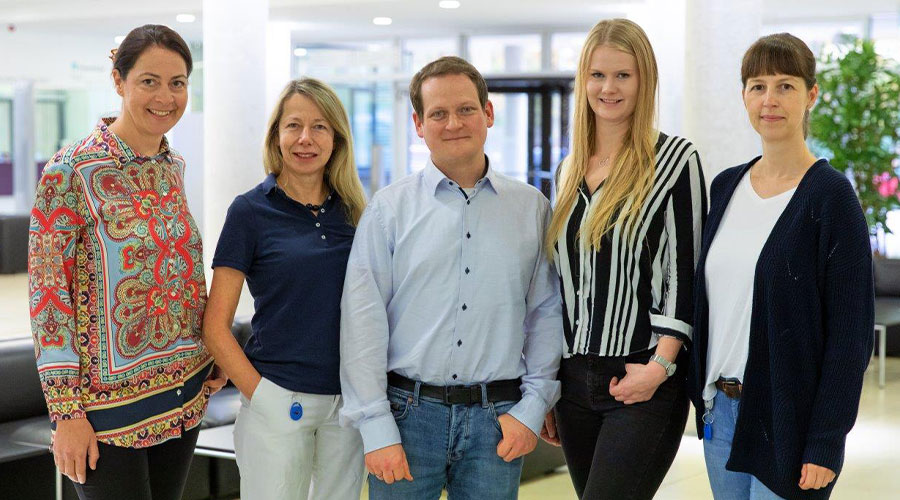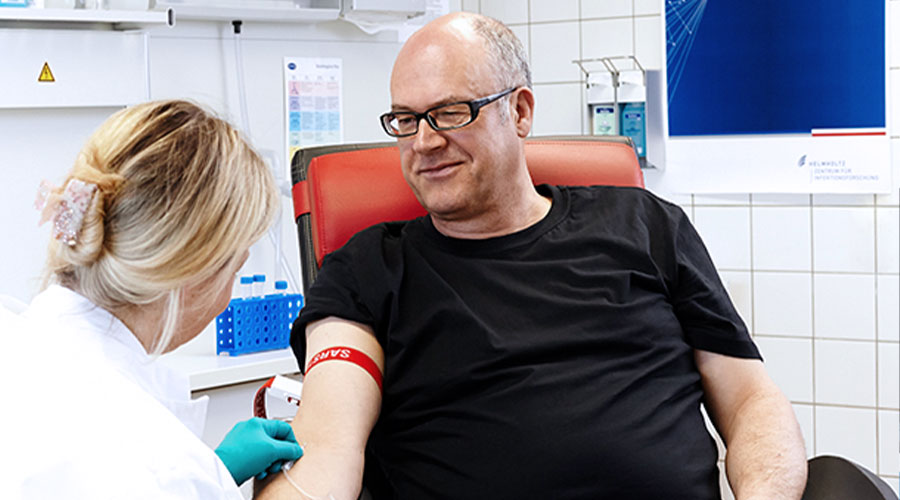A historical opportunity
The RESIST cohort with citizens from Hannover
Shingles, flu, corona – Why are elderly people often more vulnerable to viral infections than younger people? And why do vaccinations sometimes have a weaker effect on them? Can certain viruses even enhance other diseases such as atherosclerosis or diabetes? In order to answer these questions and to clarify further interplay between viral infections and age, the RESIST team has been establishing a clinical cohort since the end of 2019. A total of 650 citizens from Hannover are planned to be recruited this cohort by 2023 after they have been randomly selected and have agreed to participate.
What is the RESIST cohort?
The RESIST cohort represents a central RESIST project for other RESIST projects. This is because the data of the participants can be compared with those of patients – with the aim of better understanding and treating diseases. This is done, for example, by the projects shingles and herpes virus diseases. Furthermore, the RESIST cohort cooperates with a similarly structured cohort in which younger people participate. This makes it possible to identify age-specific differences in the findings.
“We would like to understand the underlying mechanisms and identify target mechanisms that can be used for new concepts of prevention, management and therapy of the diseases,” says Prof. Dr. Thomas Werfel. The Director of the Clinic for Dermatology, Allergology and Venereology at the Hannover Medical School (MHH) is leading the generation and evaluation of the data obtained in the RESIST cohort. Together with Prof. Dr. Yang Li and Professors Čičin-Šain, Förster, Hühn, Illig, Krause, Osterhaus, Rimmelzwaan, Schulz, Stangel (until Sept. 2021, then Höglinger) and Strowig, he previously established the RESIST cohort.
At the study centre of the Helmholtz Centre for Infection Research in Hannover, Dr Yvonne Kemmling and her team recruit the participating test subjects together with the MHH Clinic for Dermatology, Allergology and Venereology as well as the MHH Clinic for Neurology, the Hannover Unified Biobank (HUB) and a number of other RESIST working groups. The conference is chaired by Dr Stefanie Castell, Department of Epidemiology at the Helmholtz Centre for Infection Research in Braunschweig. Information for participants can be found here.
The volunteers are not only asked about their lifestyle, previous illnesses and medication, but are also medically examined (blood pressure, skin etc.). In particular, laboratory tests are also carried out to check immune functions. For this purpose, extensive laboratory tests are made using biological samples such as blood, stool and smears of the nasal mucosa.
Biosamples gathered from study participants of the RESIST cohort, the HSV cohort, and the Zoster cohort are organized, processed and documented together in a harmonized fashion, so that RESIST research projects compare them regarding the different research questions. Management of laboratory processes is performed by Dr. rer. nat. Lennart Roesner. He has a background in inflammation research and is currently working as a junior research group leader in the Department of Dermatology and Allergy Research.
Data collection and research background
Routine parameters are measured in the blood, such as liver and kidney values. The test persons can receive the results on request. In addition, specific immune reactions against viruses, for example against influenza and hepatitis viruses, are analysed, e.g antibodies and T-cells. The transcriptome also plays a role, i.e. all RNA molecules produced in the cell, and epigenetics – the factors that determine how active a gene is and how a cell thus develops. In addition, all the genes reads (the exome) are sequenced – with the aim of detecting severe infections or gene mutations. Of course the strict rules of data protection are complied. The samples are also used by the researchers for immune stimulation – for example with corona antigens. “We are conducting specific cellular tests with SARS-CoV-2 antigens in all participants in order to better understand the age-dependent immune mechanisms in the defense against this virus in comparison to other viral infections,” says Professor Werfel.
In addition, the stool samples will be used to investigate the microbiome of the intestine. This includes the question of whether there are special characteristics that can lead to viral infections in old age. This is because the microbiome can influence the immune system both positively and negatively.
“All the data obtained will help to gain insight and treat the individual susceptibility to infections. This is a historical opportunity,” says Professor Werfel.




